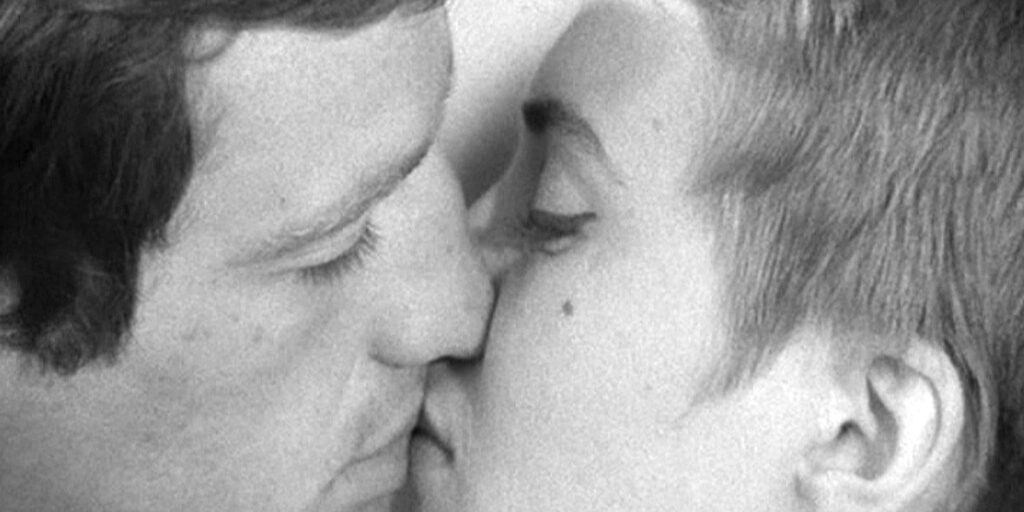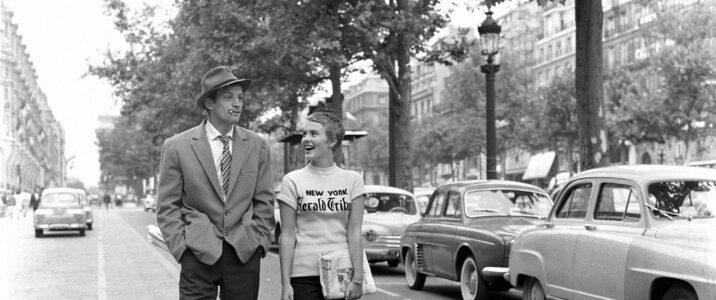Young rapscallion Michel’s (Jean-Paul Belmondo) iconic introduction in a long trench coat and dark fedora lends him the appearance of the typical film noir antihero from the 1940s as he enters the radical decade of 1960s France. We watch him observe (in the first of many instances of reflexive scopophilia) his reflection in a poster of The Harder they Fall (1956), the face of the film’s star as well as Michel’s idol, Humphrey Bogart, displaying prominently across. Michel replicates a key gesture of Bogie’s by brushing his thumb across his lips. It’s an admirable attempt at pastiche, even if he comes across as a pale imitator, regardless how many times he tries it. He is an outsider without a past, and hardly much more of an identity, whose existence in an alienating climate becomes a prevalent theme in Jean-Luc Godard’s seminal Nouvelle Vague feature debut, Breathless (À bout de souffle).
So much has been written and discussed about Breathless for the past sixty years since it first sent shockwaves across the film community. A great deal of attention has been paid to its humble beginnings with Godard, who was the last member of the eclectic group of Cahiers du Cinema critics to make their first foray into the world of directing by offering to film a treatment written by fellow Cahiers colleagues Claude Chabrol and Francois Truffaut. Preferring to shoot in a documentary fashion with cameras used primarily for photography, and without an official, complete script, the newcomer Godard left many key members of the production, including producer Georges de Beauregard and star Jean Seberg questioning its commercial viability.
Even after the film’s explosive 1960 premiere, Godard himself said he considered the film’s success to be “a mistake”; its innovative use of jump cuts resulted not from a desire in expressing radicalism, but rather a determination to trim down an overly long assembly cut. Yet audiences could not get enough of its now legendary montage of Seberg sitting in a moving car, a sequence that leaps across time and space through its jump cuts. The late film critic Andrew Sarris famously declared this visual trademark to represent “the meaninglessness of the time interval between moral decisions.”
Setting all questions of morality aside, I argue that the primary query viewers consider is the position Breathless occupies on its sixtieth anniversary. Does it still hold up after all this time, or would it be as passé for a modern audience as the post-war fashion of the film’s leads, Michel and Patricia (Seberg), seem to be within a Paris still in the nascent years of France’s Fifth Republic? Although the film’s off-kilter cinematography and unorthodox editing may appear gimmicky, there is a method to the madness.

The atypical approach of Breathless succeeds by externalizing the freewheeling, hubristic nature the film’s youthful antiheroes exude. Notice the several instances when Michel and Patricia observe their reflections; the way Michel, staring at his visage, works on his Bogie impression with cocky swagger and cool poise; or the moment Patricia, seeing herself in a newly purchased dress in front of a department store, twirls around in it with self-admiration. In his Great Movies essay, Roger Ebert characterized their personalities as narcissistic, but what prevents these egotists from being unwatchable are the discoveries they make about themselves. By the film’s end, Michel realizes too late he may not be cut out for the tough guy image he desperately crafts for himself while Patricia, who fulfills some of the traits of the Femme Fatale, does so due to her realizing her incapability of loving Michel, let alone possibly anyone.
Breathless acquires another element of intrigue when reviewing it within Godard’s body of work, and the direction the then 29-year-old auteur would take for the following sixty years. Having watched several of his other films before finally getting around to Breathless, I realized that from the very beginning Godard never considered plot a primary concern and would only further abandon a traditional narrative structure with each consecutive feature. Instead, he has more of an affinity for the ways he can provide a metatextual component to his films, dissecting cinematic and literary references, as well as turning the meaning of language inside out. In that regard, Breathless is no outlier, even if it may fall under more “conventional” standards of plot than, say, Film Socialisme (2010).
The abundance of cinematic and literary allusions in Breathless vary from blink-and-you-will-miss them moments (ie. fellow Nouvelle Vague director Jacques Rivette playing the unfortunate victim of a car accident), to more ruminatively philosophical ones. The casting of Seberg as Patricia, Godard insisted, was meant to serve as a continuation of her character in Otto Preminger’s Bonjour Tristesse (1958). In that film, she played a wealthy womanizer’s spoiled daughter who fails to grasp the ramifications of her reckless actions in separating her father and his fiancé until it is far too late. Knowing this cinematic touchstone beforehand may help lead to a better understanding of Seberg’s motivations in Godard’s own film.
With literature, references are made to a vast array of writers ranging from Shakespeare to Hammett. In one scene, Michel attempts to seduce Patricia, but she is too engrossed in her copy of William Faulkner’s The Wild Palms, later retitled If I Forget Thee, Jerusalem. The book’s final sentence prompts her to ask Michel whether he would take Grief or Nothing. He scoffs that grief is for idiots. “Nothing isn’t much better, but Grief is a compromise. I would take All or Nothing.” Patricia closes her eyes, as if trying to see a literalization of Nothingness, but she insists that she cannot see total blackness.
Even with language, Godard takes great pleasure in subverting its syntagmatic structure. A recurring theme throughout the film is Patricia questioning the meaning of terms and phrases Michel throws out. On a surface level, her inquisitiveness may be symptomatic of a naïve outsider, her distinctly American accent coloring her French. Michel finds this facet of her personality both exotic as well as worth belittling. “You Americans are dumb,” he condescendingly tells her at one point. “You adore La Fayette and Maurice Chevalier, and they’re the dumbest Americans.” But her inability to comprehend his dying words in the film’s fatalistic final scene (itself the subject of controversy for its mistranslation in subsequent rereleases), goes beyond mere sociopathy. Instead, it is a struggle to grasp the connection between words and their inherent meanings, which Godard views as a flimsy precept, easily interchangeable with various definitions.
Breathless would cement Jean-Luc Godard’s place in cinema history as one of the boldest auteurs working to this day. Even as his later work beyond the 1960s would polarize critics and baffle audiences, there is no denying a hypnotic fascination in watching him demolish all conventions within the cinematic medium as he has endlessly ventured into audacious territory with sound, editing, mise-en-scène, and even 3D to explore the politics of history and semantics. He realized quickly that he could never truly make a conventional feature, that he was more akin to Lewis Carroll than Howard Hawks. With his politics shifting further left to a more Maoist ideology by the end of the 60s, declaring commercial cinema emblematic of the bourgeoise, he seemed to fully understand his place as an iconoclast, making movies his way without concern for crossover appeal. If only Michel could have figured out his own identity sooner.
